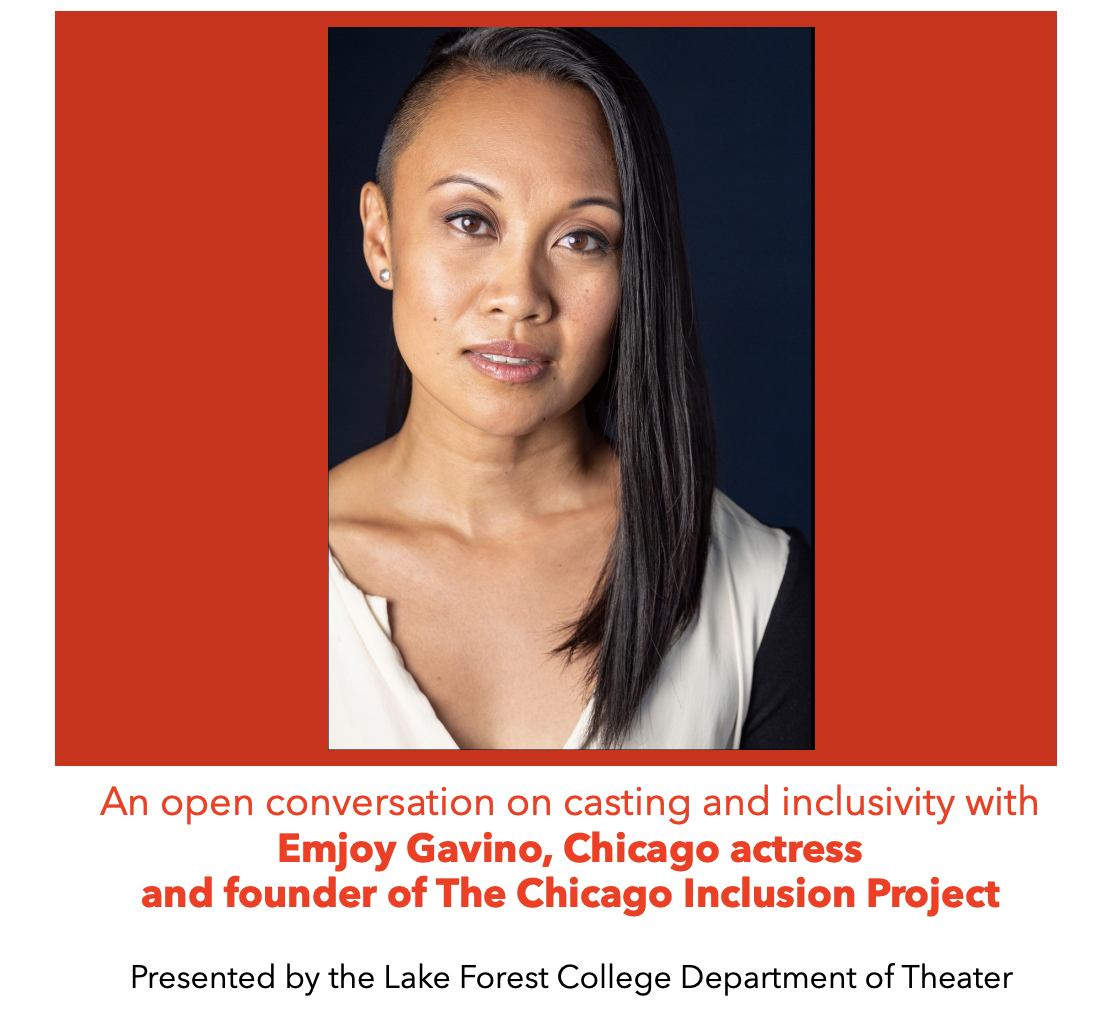Student Concerns Spark a Conversation About Inclusive Theater Casting

The Article below was published in Vol. 135, Issue 4 of the Lake Forest College Stentor on December 6, 2019
By Emma Overton ‘22
Managing Editor and News Editor
Members of the campus community gathered in Hixon Hall on November 18 for an open conversation on casting and inclusivity with Emjoy Gavino, Chicago actress and founder of The Chicago Inclusion Project, which, according to the event flyer, “exists to facilitate inclusive experiences and hiring practices throughout Chicago theatre.”
The event, presented by the Lake Forest College Department of Theater, aimed to facilitate a conversation about diversity, inclusion and casting within the theater department. Explaining why the topic held particular relevance, Associate Professor of Theater Chloe Johnston stated that “it’s something we, the theater faculty, have been thinking about over the last few years—how to make sure our department is serving all students at the College to the best of our abilities… earlier this Fall it was brought to our attention that we needed to be explicit about how we make casting decisions so that all students feel welcome and supported in our community.”
In response to a perceived lack of diversity and inclusion in the casting practices of the Lake Forest College theater department, first-year student Ajit Sharma ’23 of Kathmandu, Nepal, in a letter circulated on social media, called for the department to “diversify not only the cast but stories that are brought [to] the table.” He further noted that his “request was to decolonize the plays that we do here… decolonizing does not mean completely boycotting Anglo-centric or European or North American plays, but collaborating and bringing stories from across the globe and putting them in American perspective or perspectives that everyone can relate to.”
Sharma further noted that “I am an international student. My identity, background and the type of education that I got at [my] UWC [United World College] made me realize that it is important to have stories and people represented from different backgrounds. It helps us empathize with people and educate them about their culture…this leads to growing participation and encourages other students to come forward when stories from their backgrounds and identity are told which makes them feel represented.”
However, despite Sharma voicing his concerns, he says that he received backlash to his social media posts. “Students retaliated…some students told me that I am a Freshman, [and] I do not know how institutions work here so I need to keep my mouth shut.” He noted that others “expressed that this is a majority white institution and there is nothing wrong with doing a play from the North American context, it would be culturally inappropriate for us to do plays from other parts of the world. I completely disagree with this statement…it is not necessarily important to be Anglo-centric. Plays can be modernized and put into modern or recent perspectives.” Summing up the responses he said he received from other students, Sharma added, “although I got some retaliation, I take it as an aspect to make me stronger. It educated me much more about the world and how people perceive each other.”
According to Sharma, the idea for the open conversation event with Emjoy Gavino came about during a “meeting with the theater department about…how the department does casting…I offered a plan to organize an open forum so that we can have ideas from the student body on how to improve and, at the same time, it would give a general idea of students’ experience with casting at Lake Forest College.”
Describing the event, Sharma noted that discussion ranged from “topics like being culturally appropriate while telling stories from around the globe, [and] how [to] make everyone feel represented in plays staged on campus.” Following the conversation, Sharma noted that he is “very glad that people were positive about the changes that are happening. Obviously, it is not going to happen overnight but slowly and gradually it will. I believe it has opened doors for various stories to be represented from around the world.”
In the aftermath of the event, Professor Johnston said the theater department has taken “several concrete actions inspired by the conversation.” She notes that “we have met again with staff from OIR [Office of Intercultural Relations] to continue to develop our casting policy, we have scheduled two audition workshops, open to the whole community, to better prepare all students who are interested in performing in our spring musical, Little Shop of Horrors (workshops scheduled in Hixon Hall, 4–6 p.m., Wed., Dec. 4 and Fri., Dec. 6—email johnston@lakeforest.edu for more info).
“We will be circulating more detailed casting notices in advance of auditions to share as much info as possible with prospective actors, we are working with OIR to share information [about] theater department events with as many students as possible, [and] we will be scheduling post audition ‘office hours’ with directors so all students can get feedback on their auditions,” she said.
Johnston also noted that “we are so grateful to the many students who participated in the casting event with Emjoy and who have communicated with us in other ways about how we can build a better department. Students have shared so many great ideas, and we are really looking forward to continuing to make our department better.”
Emma Overton can be reached at overtoneg@mx.lakeforest.edu